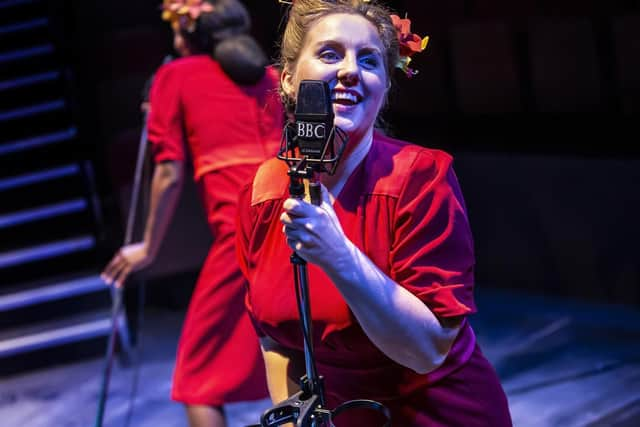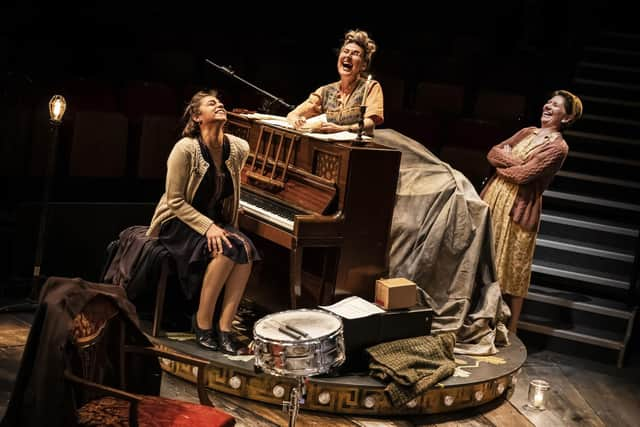Revival of The Blonde Bombshells of 1943 at the Stephen Joseph Theatre, Scarborough
The Geordie native, Hull adoptee, Plater was a master at telling the truth in his plays and using a Yorkshire vernacular to do so.
In the space of a couple of years audiences were treated to new Plater plays Sweet William (Northern Broadsides, 2005), Confessions of a City Supporter (Hull Truck, 2004) and a couple of touring productions of his classic Close the Coalhouse Door.
Advertisement
Hide AdAdvertisement
Hide AdI loved all the productions, Sweet William a particularly brilliant piece which told the story of Shakespeare in a pub on the night Henry V received its premiere.


The classiest of all the shows in that Plater-packed period was a 2004 production at what was then the West Yorkshire Playhouse, now rebranded Leeds Playhouse, of his Rolls Royce of a play with music, The Blonde Bombshells of 1943.
I remember the production particularly well because it was the first play I reviewed for the Yorkshire Post as full time theatre critic and arts writer, but also because it was so beautifully constructed and expertly directed by Roxana Silbert.
Based on Plater’s 2002 BBC TV film, Last of the Blonde Bombshells, the play with music was a hit. Michael Billington at the time said that the piece ‘hits three buttons in one go: nostalgia, swing and female empowerment. With all that going for it, it’s bound to have a life far beyond Leeds’.
Advertisement
Hide AdAdvertisement
Hide AdBillington was, as he usually is, correct and that far beyond life now stretches to a new production of The Blonde Bombshells of 1943 taking residency for the whole of August during Scarborough’s Stephen Joseph Theatre’s most vital period of the year, when the theatre needs a sure-fire hit to tempt the punters out of the rain of the English summer and into the auditorium.


The play tells the story of a band with a shot at the big time – and the same band members in the future, looking back at what happened when they had their shot.
Zoe Waterman is the director at the helm of the production playing Scarborough this summer, in a co-production between Stephen Joseph Theatre, Octagon Theatre in Bolton and Theatre by the Lake in Keswick.
Waterman says: “It’s the story of a band that is brilliant, bolshy and glamorous enough to be appearing live on the BBC.
Advertisement
Hide AdAdvertisement
Hide Ad“That means our cast had to be absolutely stellar musicians. Watching (musical director) Greg Last bring them together in just a few short weeks to find lyrical brass solos, swinging bass lines and perfect harmonies has been a masterclass in technique, while also finding the emotional heart of these songs.”


For many audiences, Plater is best known as a television writer, his work from Z Cars to A Very British Coup cementing his place in British TV history, but it was his original piece, The Beiderbecke Trilogy, that lifted him above the rest. A Leeds-set story starring James Bolam as jazz obsessive Trevor Chaplin, it incorporated Plater’s deep passion for jazz music.
It is little surprise, then, that the band he invented for The Blonde Bombshells were dab hands when it comes to playing jazz, alongside the music of Glenn Miller, The Andrews Sisters and Fats Waller, all of which feature in the Plater musical.
Waterman is up for the challenge set by the late Plater, who died in 2010.
Advertisement
Hide AdAdvertisement
Hide Ad“The company also need to be fantastic actors – these are glorious characters,” she says. “They are strong, dedicated, funny women, making a way for themselves in an utterly transformed world. We see the camaraderie and deep friendships they have formed, but also the pain and horror just under the surface four years into a bitter and deadly war.
“There are the opportunities the war, and the subsequent lack of men, provide them at a time when the traditional route for women of becoming a wife and mother was paved with dirty nappies, potato peelings and the sacrifice of any kind of autonomous, financially independent life.
“It is such a privilege to weave these threads together, losing ourselves in the music and then re-emerging to witty ripostes and female solidarity. It remains vanishingly rare to work on plays with this many female characters.”
Lots of reasons why it’s good to see Plater’s work back on Yorkshire soil.
At the Stephen Joseph Theatre, Scarborough to August 26. sjt.uk.com